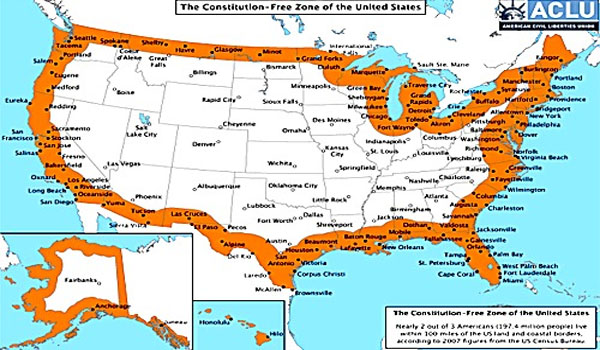U.S. Constitution
See other U.S. Constitution Articles
Title: Thug Border Patrol Agents Rip Man from his Car for Asserting His Constitutional Rights (This is what life in a police state looks like)
Source:
Free Thought Project
URL Source: http://thefreethoughtproject.com/vi ... serting-constitutional-rights/
Published: Mar 18, 2015
Author: Matt Agorist
Post Date: 2015-03-19 07:34:32 by Deckard
Keywords: None
Views: 2534
Comments: 10
A shocking video posted to youtube Monday shows what life in a police state looks like. A family was on their way back from a doctor’s appointment when they drove through a checkpoint that was staffed by tyrants. Rick Hebert was simply traveling through the checkpoint and lawfully refused to tell the agents where he was going. This checkpoint was well inside the US border on Highway 89 North. At these constitutionally questionable checkpoints, you are not required to answer the agent’s questions (usually starting with “Are you a United States citizen?”). Nor can the agents require you to consent to any searches. Apparently the agents at this checkpoint are unaware of the constitution. This man simply asserts his rights and is subsequently assaulted and kidnapped in front of his 4-year-old son and wife. The video is horrifying. This is what life in a police state looks like.
Post Comment Private Reply Ignore Thread
Top • Page Up • Full Thread • Page Down • Bottom/Latest
Begin Trace Mode for Comment # 10.
#1. To: Deckard (#0)
I guess they thought the guy was John Dillinger. From now on, he should travel with an attorney in the back seat.
I wonder if he was stopped in the "Constitution-Free" Zone?
Federal regulations give U.S. Customs and Border Protection authority to operate within 100 miles of any U.S. "external boundary." The U.S. Constitution still applies, though the fourth amendment does not apply fully at our borders. But you're saying the U.S. Constitution does not apply to those citizens living within 100 miles of our border? Wow! I did not know that.
You don't see the flaw in your "logic"? You do realize that entire STATES are affected by this bullshit, right?
You don't see the flaw in YOURS??? That the U.S. Constitution does not exist within 100 miles of the border? "Not only is the expectation of privacy less at the border than in the interior, the Fourth Amendment balance between the interests of the Government and the privacy right of the individual is also struck much more favorably to the Government at the border." Carroll v. United States
There are no replies to Comment # 10. End Trace Mode for Comment # 10.
Top • Page Up • Full Thread • Page Down • Bottom/Latest
#6. To: Stoner (#1)

#8. To: Deckard (#6)
"I wonder if he was stopped in the "Constitution-Free" Zone?"
#9. To: misterwhite (#8)
(Edited)
The U.S. Constitution still applies, though the fourth amendment does not apply fully at our borders.
#10. To: Deckard (#9)
"You don't see the flaw in your "logic"?"
Florida v. Royer
Almeida-Sanchez v. United States
Replies to Comment # 10.
[Home] [Headlines] [Latest Articles] [Latest Comments] [Post] [Mail] [Sign-in] [Setup] [Help] [Register]
